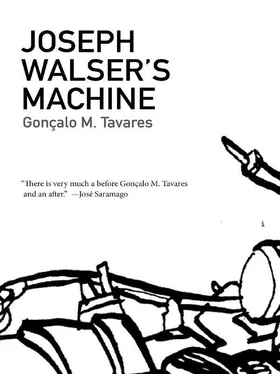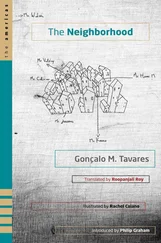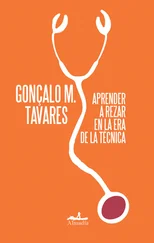Over those years, the chaotic and unpredictable violence of the war had exhausted men. Simple, almost petty desires began to take on significant proportions. More and more each day, Margha Walser reminded her husband of the peaceful walks they used to take through the main city garden.
Certain people still had memories of a noiseless sky, one without airplanes. And there were memories too of something that had disappeared completely, at least in the public parts of the city: laziness. How long had men and women been deprived of the right to laziness, to moments devoid of useful action, and what’s more: moments devoid of meaning.
For in wartime the meaningfulness of actions had become — as they say — inflamed, contaminated with something that quickly spread from one body to another, from men to women, from women to children, to the elderly, to the disabled: every single action had taken on meaning: What do you mean by that? What are you doing? Where are you going?
Laziness in wartime was either an obscenity — a lack of respect for those who were on the verge of dying or killing (one lowered ones eyes when faced with the victim or the perpetrators) — or else this action without action, laziness, was simply a manifestation of insanity: a retreat from the new norms.
Because actions full of import and meaning were the norm in wartime, and laziness was their inverse. Seeing someone who wasn’t doing anything and didn’t want to do anything would cause as much amazement and, probably, as much disapproval as seeing a lunatic in the middle of the city garden, in spring, repeating his brusque, impulsive movements: ripping flowers violently from the ground, stomping on flower beds, digging holes in the dirt with his fingers. During times of great intensity, someone who didn’t know where he was headed or why he was doing what he was doing was a lunatic, for he was abstracted from the events around him. To delve into the world of abstraction in wartime — a period of absolutely concrete things, a period when matter and energy collide and battle one another — was the most violent of actions. Perhaps even the most immoral.
By the same token, Klober had already asked Walser this question: “Which is more immoral in times like these: to kill someone or to learn geometry?”
And Walser had never known how to respond.
The war is over! This authoritative phrase is published in the newspaper. People celebrate and hug their family members, inside their homes. Out on the street the handshakes are more vigorous, robust; friendships are reestablished, downcast eyes are raised a few inches: people now look at the upper half of other people’s faces, and it’s as if there is an implicit recommencement of all personal relationships. No one expresses it verbally; there is a general sense of embarrassment in friends who haven’t spoken for years, but nevertheless a handshake between two men is able to accomplish what takes engineers months to do with destroyed houses: after all, a human feeling is a lighter and more easily repaired substance than stone, brick, or cement.
Certain habits are resumed after a few days. The butcher shop starts to open earlier; an obese man chops meat with renewed brutality. Fruits that haven’t been seen for years begin to appear in the grocery stores, and money starts circulating, so much so that it almost seems that someone just started handing it out after the war ended.
There’s a new excitement in the streets, a new vigor, a new will to do and to act, something very similar to what was felt during the first few weeks of the war. It may signify the opposite, but the energy at the root of this feeling is the same: organisms are always stimulated by change, are only stimulated by change.
Joseph Walser is excited, like all the city’s inhabitants; he doesn’t run through the streets, as some children are doing, but he does proceed quickly, with vigorous, resolute steps. He doesn’t look like Joseph Walser.
“It’s over,” he says to himself, multiple times a day, for multiple days in a row; it seems that he can’t tire of repeating it, for he doesn’t yet think of it as a repetition, but rather as something surprising; he repeats: “It’s over and I’m alive!” As if, strangely, being alive could be the end of something.
On one of those afternoons, after giving him a kiss, his wife, Margha, says, “We did it, Joseph!”
Clairie’s hands straightened up the small objects on the table for the third time. She moved them slightly to one side or another, just a few inches. She examined her face intently: her lips, her eyes, her nose, her hair. She straightened her neckline, searching for a way to project either indecision or inattention, leaving a little on display, but not too much. She knew that her breasts were still the chief source of interest in her body. She unfastened a button, pulled her shirt down lower, to the sides, seeking the perfect combination of clothing and breasts.
On that Sunday, the sun was behaving in a surprising way. From the early morning, the bright light portended a hotter day than had been forecast. It made Clairie happy. The sun had a positive effect on everyone, and in the afternoon she expected, at the end of a long wait, a visit from Mr. Walser.
As she waited, she went back into her bedroom and straightened the bedsheets again. Her body was occupied by a useful enthusiasm; she can’t stop: she tidies up, cleans, straightens things up, and once again goes over to the mirror.
Meanwhile, people are strolling in the city garden, but in a dissolute way, as if bodies were substances that could evaporate. An imposed laziness. It’s Sunday and the sky has behaved impeccably. Nary a cloud to be seen.
Distant friends embrace each other heartily and immediately shake hands. Nothing is blown about by the wind: it blows down from above, caressing men’s faces gently and then moving along. Women can only sense it when they are quiet and motionless: the transitory wind.
The city garden brings the people’s shoes to a halt, while four children transform into innumerable children as they play on the grass, because they never stop moving and are thus difficult to fix in one place. They play, and each marvel is cut short by another marvel; or at least they try to demonstrate that they’re different from the adults. “When you see a body that constantly changes position, you are looking at a child,” says someone. A definition of childhood proffered while this someone puts his hands in his pockets to look for a business card with his name on it. It’s Sunday, but certain friendly contacts may prove useful in one’s profession. Not everything that’s pressing on Sunday is pressing on a weekday, but sometimes there are overlaps, even important ones.
The city infused with a dense happiness, a kind of controlled exultation that builds in layers, one on top of another.
Just outside the gardens, the city carries on apace with its memory well disposed toward forgiveness. There are only smiles; no one speaks of the past.
The important families of the city alter their routes in order to cross paths with each other.
Just over a month had passed since the war ended: Joseph Walser pushed his shoes aside with his foot. He was naked in front of Clairie.
Clairie had gained even more weight during that time, but she hadn’t ceased to arouse Joseph. After some minor advances and retreats Walser was now in Clairie’s house, naked, and exposing his erect penis. The lights had been turned off, at her request. Clairie gripped Joseph’s penis and made vigorous movements. Joseph had already taken off her clothes and was now forcefully grabbing the ample breasts that hung over her stomach. Joseph Walser’s fingers moved, one by one, down the length of her fat breasts, and at times contracted, forcefully gripping the woman’s flesh. Walser’s penis was already buried within her, disappearing into her copious pubic hair, forcefully penetrating into and pulling out of her vagina; his hands squeezed Clairie’s fat legs, as well as the sides of her buttocks. Walser concentrated on the movements of his penis, penetrating and pulling out, and, more aroused every minute, he had started to pull her hair forcefully when he suddenly felt as if he’d been pushed backwards. Clairie was pushing him!
Читать дальше












